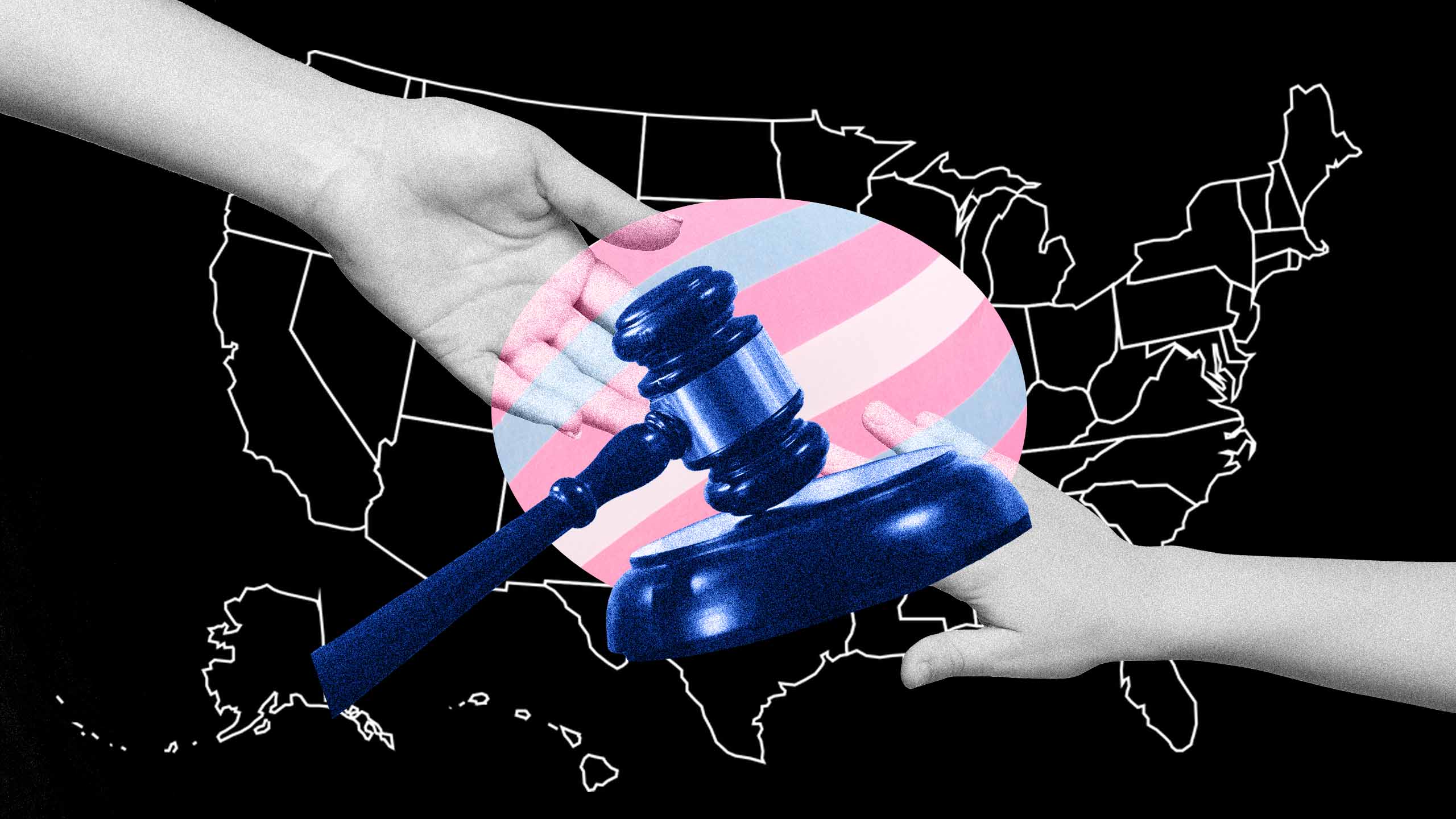Attacks on gender-affirming care in the U.S. have escalated significantly in recent months, as an increasing number of states move to ban or severely limit necessary and life-saving medical care for trans and non-binary youth. At least eight states—including Alabama, Arkansas, Mississippi, South Dakota, Tennessee and Utah—have completely outlawed or severely restricted gender-affirming care for minors, while lawmakers in 23 other states are currently considering a host of similar bills, some of which attempt to criminalize this care by making it a felony for healthcare providers.
Research has shown that gender-affirming care can significantly improve mental health outcomes for trans and non-binary youth, who are already at an increased risk of depression and suicidal ideation. Banning this care, however, can have the opposite effect, especially if kids and teenagers are already in the process of receiving this care and are forced to detransition.
In Florida and Texas, lawmakers have turned this legislative crusade against gender-affirming care into a custody battle as well. Last year, Texas Gov. Greg Abbott ordered the Texas Department of Family and Protective Services (DFPS) to launch child abuse investigations into the parents of trans kids receiving gender-affirming care, which could cause them to lose custody of their children. Less than a month later, DFPS officials confirmed the agency had already opened nine investigations into the families of trans youth undergoing the process of socially and medically transitioning.
Amber and Adam Briggle were among the first to be investigated in March 2022 for affirming the identity of their teenage son. In an interview with PinkNews, Amber said the entire experience was “traumatizing” for her whole family, adding that they lived in fear for months until the investigation was finally closed more than 100 days later, just as the family’s lawsuit against the state was about to have its first day in court.
Gov. Abbott’s child welfare directive has been blocked by Texas judges three times already, and still remains blocked for families belonging to PFLAG, since the advocacy organization is one of the plaintiffs in a lawsuit against the state challenging the directive. However, Texas attorney general Ken Paxton has once again appealed the injunction halting DFPS investigations earlier this month so that they may continue. Even with this brief reprieve, supportive parents of trans kids are still on edge as the Texas state legislature advances a bill that would ban all gender-affirming care for minors after passing the state senate on March 20.
Meanwhile, Florida has already banned gender-affirming care for trans kids who have not yet begun treatment, per a new rule from the state’s medical board, but is now seeking to interfere with custody agreements. Earlier this month, Florida lawmakers proposed a new bill that could potentially allow trans kids to be removed from the custody of their supportive parents. While the bill has since been revised and no longer includes some of the more extreme language, such as comparing gender-affirming care to child abuse, it would still allow a parent residing in or visiting Florida to sue an affirming parent for emergency custody of a child receiving gender-affirming care.
“As far as we are aware, this is the first proposed bill of this kind,” Carl Charles, a senior attorney at Lambda Legal, tells Xtra. “It is the most similar (though not identical) to the actions taken by the governor and attorney general in Texas to direct child protective services to initiate ‘child abuse’ investigations of parents who are supportive and affirming of their trans children.”
Simone Chriss, a civil rights attorney and director of the Transgender Rights Initiative at Southern Legal Counsel, stresses that, while similar, the two are by no means the same. According to Chriss, the Texas directive allows the state to initiate custody removals, while the Florida bill allows divorced parents who have custody agreements in place to sue for sole temporary custody in order to prevent a child from receiving gender-affirming care in another state.
“It’s not to ‘protect’ the child from getting care here. It’s to ‘protect’ the child from getting care elsewhere,” Chriss tells Xtra, emphasizing the fact that Florida has already banned this care for minors who weren’t already receiving it when the rule took effect on March 16. “The people for whom this is really scary and really something that we need to be figuring out how to address are folks in other states, folks in affirming states that aren’t passing these awful bans on gender-affirming care,” she says. For example, Chriss says that a parent in New York with a 50/50 custody agreement could bring their child to Florida and ask the state “to take jurisdiction and change the custody order to give that parent custody to ‘protect’ that child.”
The bill would enable this by amending Florida’s Uniform Child Custody Jurisdiction and Enforcement Act (UCCJEA) to create an exception for unsupportive parents who want to stop their children from transitioning under the supervision of their affirming parent(s). “What’s ironic is that act was literally tasked to prevent and prohibit parental kidnapping, and so the fact that this is under that provision of Florida codifying the UCCJEA in our statute, it’s just so at odds with federal law,” Chriss says. “This would be a carve-out. This would be allowing that to happen even though common sense dictates and the law dictates that this should not happen.”
According to New York City-based marriage and family law attorney Brett Ward, the UCCJEA does give state courts emergency jurisdiction in extreme exceptions, like in the case of people fleeing domestic violence. While the bill does not compare domestic violence to gender-affirming care, Ward says that the bill would essentially be “equating that limited doctrine and expanding it,” by allowing gender-affirming care to be considered an emergency circumstance and not respecting other states’ orders.
As a result, legal experts say the bill would be unconstitutional and could pose a great risk to the well-being of trans kids and their supportive parents. “It basically tilts the scales in the balance of the transphobic parent,” Alejandra Caraballo, a clinical instructor at Harvard Law School’s Cyberlaw Clinic, tells Xtra. While Caraballo says the language in the original version of the bill was much more extreme and egregious, the bill is still “horrific” because “parents could still lose custody of their child simply for supporting their child’s trans identity.”
For Gainsville mother Bethany, who is using a pseudonym to protect her privacy, whether or not her trans daughter will be able to continue receiving gender-affirming care in the state remains unclear. Her daughter Lucy, who also wishes to remain anonymous, is 13 years old and is currently taking puberty blockers to delay the onset of puberty. Since Lucy was already on puberty blockers when Florida’s ban on gender-affirming care took effect, she will still be allowed to continue her treatment. However, Bethany is unsure if Lucy will be allowed to advance her care and receive hormone replacement therapy in the state of Florida. As a result, she is eager to take Lucy and her other children and move to a different state with better protections for gender-affirming care, but her ex-husband, who Bethany says took a while to come around to their daughter’s transition, is resistant. After reading articles in The Atlantic and other publications that framed gender-affirming care in a negative light, he had become afraid of letting Lucy medically transition.
“Our first visit to the gender clinic, which was really just informational, I would say he was a bit confrontational with the pediatric endocrinologist,” Bethany says. “But then we had more psychological evaluations. We had nine months in between. He reluctantly agreed to starting puberty blockers and he reluctantly agreed to birth certificate changes and name changes. But I think that what has really softened him on it is that Lucy is thriving.”
Ever since Lucy came out and started receiving gender-affirming care, Bethany has seen a notable difference in her daughter, adding that while she’s still the same person and loves the same things, she’s much more herself. Lucy says that transitioning and having access to this care has made her feel more comfortable in her body. “I just feel a lot more comfortable with people talking to me and saying my name and referring to me,” she says. “I think that people should be able to express themselves the way that they want and be able to get the care that they deserve.”
While Bethany says her ex-husband has come to accept Lucy and the care she is now receiving, she is scared of renegotiating her custody agreement to allow her to move out of the state.Currently, Bethany’s custody agreement dictates that her children “can’t move more than 50 miles from the other parent.” Bethany says she doesn’t want to villainize her ex-husband, but admits that she is wary of what he will do or what the family court will decide if she tries to alter their custody agreement following the potential passage of this bill.
“I’m genuinely afraid if I open the family court thing to try to fight him to sort of be assertive about it, that he will be granted full custody and I won’t because I’m the one who’s actively trying to get her affirming care,” she says. As a result, she is following her ex’s lead for now and has agreed to wait until the final version of the bill is passed, if at all, before seriously considering moving out of the state. The bill is making their ability to “navigate what are already incredibly difficult situations, even more difficult,” Bethany says. “It’s fundamentally telling me that me and my child can’t have agency around her existence.”
According to Brandon Wolf, press secretary for Equality Florida, the real danger of the bill is not just that it would allow trans youth to be removed from the custody of their supportive parents, but that it would also disrupt the care that they are receiving. “It’s not even that we would just potentially see delays in care, we can see that care be denied entirely, with the courts favouring an unsupportive parent, even if that young person has already begun the process of gender-affirming care,” he says.
That’s why some states are moving to protect gender-affirming care for both minors and adults. Just this month, Minnesota Gov. Tim Walz signed an executive order ensuring that trans people have the right to access gender-affirming care in the state. In addition, Colorado and Oregon are also currently considering similar bills that would expand protections and access to gender-affirming care. California has also become the first “sanctuary state” for trans kids in the U.S. The state legislature passed a law late last year that allows trans youth to seek refuge in the state and prohibits the enforcement of another state’s order to remove a child from the custody of their parents for providing access to gender-affirming care.
Caraballo notes, however, that other states beyond Florida and Texas, like Wyoming, are attempting to criminalize gender-affirming care and classify it as child abuse, which can also lead to custody issues. “Every state regulates its family courts and family laws differently, especially with regards to child protective services or family protective services … but by broadly categorizing gender-affirming care as child abuse, that can bring with it a whole host of potential criminal sanctions or criminal charges,” she says. Caraballo argues that banning and criminalizing gender-affirming care could “set up the stage for removing trans kids from the custody of their parents.”
“It’s not hard for an agency to follow what Texas did and essentially issue an administrative rule or an administrative order saying that, in their view, it is abuse because this is outlawed by the state medical board,” she says. “It is a very dystopian path to go down.”


 Why you can trust Xtra
Why you can trust Xtra


